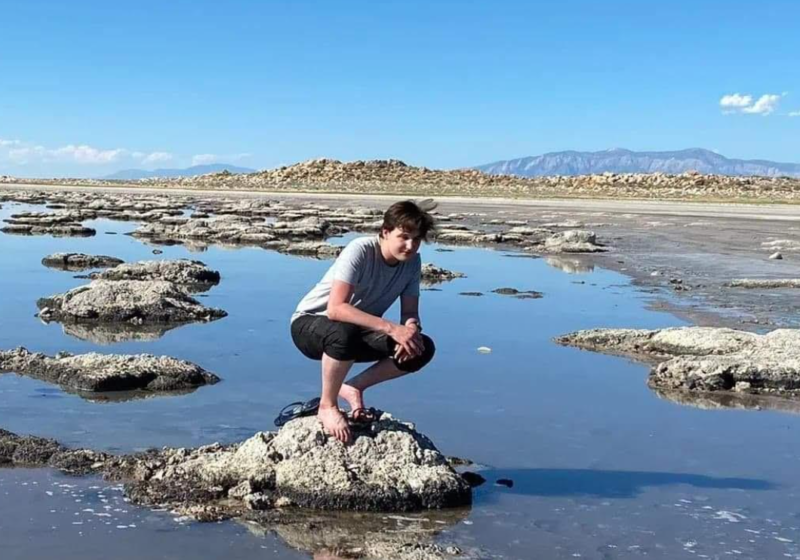Thomas Anderson loves engineering. A lot.
“I’m a Mechanical Engineering major with a minor in Electrical and Computer Engineering. Originally, I wanted to double major in both and I realized that that was a lot of credits, even if I overloaded, so I decided to major in one and minor in the other,” Anderson chuckled. “I ended up liking Mechanical [Engineering] more because I really like the fact that you are able to use math and physics to your advantage to [then] make something physical that can function.”
When he’s not in class, you can find Anderson 3D printing parts of his design, falling off of things, or traveling around the country. “I went to Mississippi and Utah this summer, which was pretty chill,” Anderson said “I saw Antelope Island which is a National park full of antelope and stuff. Oh and brine shrimp, which was really fun — a lot of hiking around.”
Anderson also sat on the EBoard of IEEE (Institute of Electrical and Electronics Engineers), an honors club where he was the event coordinator, and was involved in the University’s Robotics Club, where he became passionate about engineering and more involved in mechanical industry. “I have had two internships: one last year, which was essentially working for an aerospace MRO (Maintenance, Repair, and Overhaul) company called StandardAero, and another company called Chromalox, which makes immersion heaters for different clients and industries.”
At StandardAero, Anderson’s project involved working in the jet engine testing cells for Turboprop engines, which have propellers or, as Anderson calls them, “spinny blades,” on the outside. There, Anderson’s job was to redesign the emergency stop system for the cells to ensure that it functions as it should for Rolls-Royce AE2100 and T56 engines.
“The big issue was that the E-stop (emergency-stop) would just cut off the entire engine, but the workers could not get the engine to stop as quickly as they wanted it to,” Anderson stated. “The big problem with this is the fuel valve itself had about 50 feet of pipe between it and the actual engine, so even when the valve was closed, the engine would still have fuel to run on for a while. This is bad because the oil lines that feed oil to lubricate the inside of the engine would cut out earlier than the fuel would. The attached engine would grind itself down on the inside.”
Anderson fixed this problem by speccing and adding a new pneumatic valve to the E-stop wiring that was much closer to where fuel enters the engine. “This is so that the engine shut off time would be a lot less,” Anderson explained. “For instance, if there’s an emergency, we want the emergency stop to function quickly, say in 30 seconds. We don’t want it to take 6 minutes.”
Along with this, Anderson completely rerouted the functionality of the old E-stop to ensure that it worked safely and efficiently. “So I cut power to everything in the testing room except to a guarded switch, and then modified the existing E-stop to just cut off fuel and send signals to the engine to turn it off. The whole experience was pretty cool. I had a lot of fun with it,” he added.
At Chromalox, Anderson’s job was more straightforward. His primary goal was to make “IKEA-style” instruction manuals that condense the nitty gritty engineering and make it more easily accessible to workers. “Up until that point, about 43% of the heaters failed the final testing because they were put together improperly. Many new workers were there with no training or reference on how to do things correctly. Making better instruction manuals for different types of heaters would help workers understand this information and it kind of helped me learn the processes that go into making heaters.”
Going into his internships, Anderson faced his challenges head on. “At my first internship, they just kind of said ‘we need you to do this project, figure it out yourself,’ basically. One of the issues in the first two weeks of that was I was just kind of instructed to build an electrical system and you’re not really given any pointers of where to start. So the first couple of weeks was figuring out the system and the layout by myself, and kind of independently getting things done. It was both really fun and at the same time really nerve-wracking because I spent a couple of days wondering ‘what am I doing’ and ‘is this even useful’ and you kind of freak out a bit.”
Anderson’s hard work paid off when his ingenuity, research, and hard work not only helped him strengthen his engineering skill, but also allowed him to leave a lasting impact on the industry he loves. “At StandardAero, my big ‘Aha!’ moment came a few weeks in, where I felt like I was finally getting a grasp on how the machinery system is put together and what goes with what thing. I was looking at the actual physical system, looking at all the wires and where they connect, and finally figuring out how the entire thing got together. This was really kind of great because this allowed me to document things that hadn’t been documented about the engine’s functionality and I could now work on finding a solution to the issues. I could actually get from Point A to Point B now in my project.”
At Chromalox, Anderson’s solutions have had lasting effects on the company that were felt on many levels. “A big moment was when several heaters they were working on were finally being assembled correctly, and they were using [my] manual to assemble it. It’s really nice to know that something I had worked on was actually useful and contributed something.”
Chromalox has discussed making Anderson’s instruction manuals available in their factories worldwide. “Who knew that me and a bunch of 22 year olds who spent a summer making these manuals could have impacted not only the specific factory I interned at, but also have benefitted other Chromalox factories globally?”
Anderson encourages those interested in engineering or research to persevere through their difficulties. “If you are doing an internship, expect the first couple weeks to feel like you don’t know what you’re doing and what your purpose is,and as much as it sucks, acknowledging that it’s going to be a struggle initially is important. It will eventually pass.”
Being in his final year, Anderson aims to finish college. “And then in terms of a career plan, I would like to do something in aerospace or additive manufacturing, those are the two industries I want to go into.”
But that’s not all.
“Oh, and I really want to work as an engineer in Antarctica for at least a year at some point after I graduate,” Anderson said, unfazed. “That would be really, really cool.”




